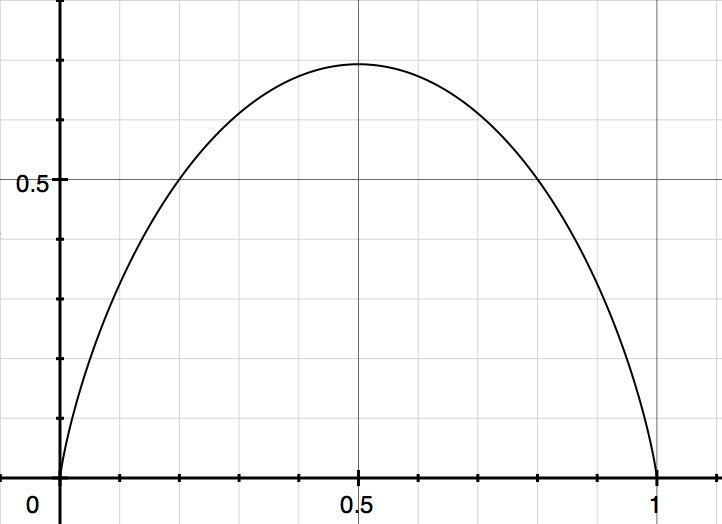What is $$\lim_{n\to\infty} \displaystyle \sum_{k=0}^{\lfloor n/2 \rfloor} \binom{n}{2k}\left(4^{-k}\binom{2k}{k}\right)^{\frac{2n}{\log_2{n}}}\,?$$
-
1$\begingroup$ Do you mean $\log_2n = (\log n)/(\log 2)$ or $\log_2 n = \log\log n$? $\endgroup$– Greg MartinCommented Apr 12, 2014 at 18:59
-
$\begingroup$ @GregMartin Very much the former. The constant factor seems to make a difference as to whether it converges or not. $\endgroup$– SimdCommented Apr 12, 2014 at 19:06
-
$\begingroup$ I observe that the summand seems to peak around $k \sim n/(\log_2 n\cdot \log\log n)$, so working out how big it is there would be useful. $\endgroup$– Greg MartinCommented Apr 12, 2014 at 19:08
-
$\begingroup$ It can be show that in Maple soft, your limit is unbounded. $\endgroup$– user48365Commented Apr 12, 2014 at 20:58
-
2$\begingroup$ Given S. Carnahan's answer, it's clear that this really is a borderline case that's extremely interesting. Kudos for posing an insightful problem! $\endgroup$– Greg MartinCommented Apr 15, 2014 at 18:55
1 Answer
First, we note that Stirling's series yields $4^{-k} \binom{2k}{k} = \frac{1}{\sqrt{\pi k}}e^{-1/8k + O(k^{-3})}$.
Let $c = k/n$. Then
- $\log n!$ expands as $n \log n - n + O(\log n)$.
- $\log (2k)!$ expands as $2cn \log 2cn - 2cn + O(\log n)$.
- $\log(n-2k)!$ expands as $n(1-2c)(\log n + \log(1-2c)) - n(1-2c) + O(\log n)$.
- $\log \binom{n}{2k}$ expands as $-2cn\log 2c - n(1-2c) \log (1-2c) + O(\log n)$. This is $n$ times the following function of $2c$:

- $\frac{2n \log 2}{\log n} \log\left(\frac{1}{\sqrt{\pi k}}e^{-1/8k + O(k^{-3})}\negthinspace\right)$ expands as $\frac{n \log 2}{\log n}(-\log n -\log c -\log \pi) - O(\frac{1}{c\log n})$
We need to consider the asymptotics of the sum of the 4th and 5th terms. The 5th term is dominated by $-n \log 2$, unless $c\sim 1/n$ (i.e., $k\sim 1$ - a short calculation shows we don't need to worry about this case). From calculus (or brief examination of Pascal's triangle) the fourth term achieves its maximum value of $n \log 2$ at $c=1/4$. The sum is then dominated by the term $\frac{n \log 2}{\log n}(-\log c -\log \pi)$. Since $\pi c = \pi/4 < 1$, we have $(-\log c -\log \pi)>0$, so the sum $\frac{n \log 2}{\log n}(-\log c -\log \pi) + O(\log n)$ increases without bound.
In conclusion, the sum diverges, because the summand for $k = \lfloor \frac{n}{4} \rfloor$ increases without bound as $n$ increases.
-
$\begingroup$ Is the OP right that convergence depends on the constant in the exponent? I can't immediately tell from your answer. $\endgroup$– SimdCommented Apr 13, 2014 at 10:51
-
1$\begingroup$ @Anush Yes. In the fourth expansion of my list, the optimal coefficient of $n$ is about $0.14676$, and the coefficient of $n$ from the fifth sum is $-\log 2$. Thus, if you divide the exponent by more than about 4.722967, the limit diverges. [Edit: this is not accurate - see later comments.] $\endgroup$– S. Carnahan ♦Commented Apr 13, 2014 at 14:11
-
$\begingroup$ Shouldn't the function in (4) be $n$ times $-2c\log2c - (1-2c)\log(1-2c)$ rather than $-2c\log2c + (1-2c)\log(1-2c)$? $\endgroup$ Commented Apr 14, 2014 at 7:21
-
$\begingroup$ @GregMartin You're right, thanks. I've made quite a mess of this question. $\endgroup$– S. Carnahan ♦Commented Apr 15, 2014 at 5:00
-
1$\begingroup$ @Anush Yes. The OP's exponent is precisely what is needed to cancel the $n \log 2$ from $\log \binom{n}{2k}$ for optimal $k$. This is why I needed to consider the sub-leading term with the $\pi c$ computation. If the exponent is smaller, the sums diverge even more wildly, and if the exponent is larger, the sums converge to 1. $\endgroup$– S. Carnahan ♦Commented Apr 15, 2014 at 6:51
